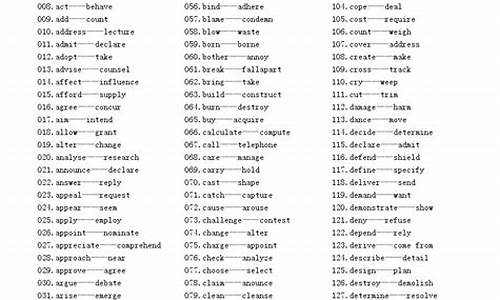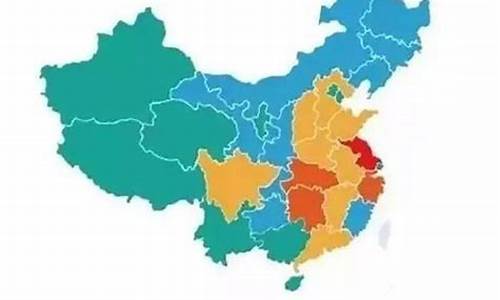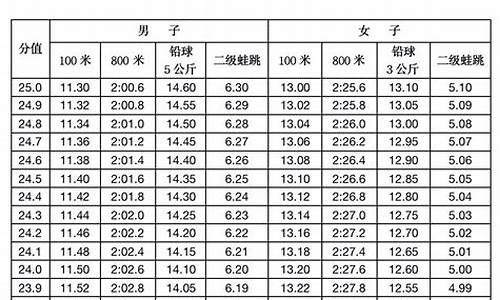您现在的位置是: 首页 > 教育改革 教育改革
高中英语常考近义词_英语高考近义词
tamoadmin 2024-06-12 人已围观
简介1.2021年广西成人高考英语科目同义词辨析方法?2.高中英语重点词组(近义词发放一起的)3.英语单词之同义词、反义词,知道的同学帮帮忙找找,谢谢!4.英语近义词、反义词5.用英语单词50组近义词?6.甘肃专升本考试之公共课英语近义词辨析(2)?7.英语近义词大全短语近义词:飘荡(飘动)、凉爽(凉快)、环绕(围绕)尽情(纵情) 反义词:凉爽(闷热)、欢乐(痛苦) 解释(说明、解说)、理解(懂得、了
1.2021年广西成人高考英语科目同义词辨析方法?
2.高中英语重点词组(近义词发放一起的)
3.英语单词之同义词、反义词,知道的同学帮帮忙找找,谢谢!
4.英语近义词、反义词
5.用英语单词50组近义词?
6.甘肃专升本考试之公共课英语近义词辨析(2)?
7.英语近义词大全短语

近义词:飘荡(飘动)、凉爽(凉快)、环绕(围绕)尽情(纵情) 反义词:凉爽(闷热)、欢乐(痛苦) 解释(说明、解说)、理解(懂得、了解)、旅游(旅行、远足)发现(发觉)、飘零(飘落)、奉献(贡献)、回归(回来)、肥美(肥壮、肥沃)、葱翠(青翠)、茁壮(强壮、健壮)映照(映射、照耀)、挺拔(挺立、苍劲)、赞美(赞扬、歌颂)、透明(透亮、晶莹) 宛如(犹如、好像)、一般(一样、普通) 映衬(衬托)、神往(向往)、越发(更加)、雄伟(雄壮)、纯净(纯洁)、壮丽(壮美)、明洁(明净) 装点(装饰)、嘱咐(叮嘱)、宝贝(珍宝)、迷惑(困惑) 拜访(拜望、访问)、憨厚(忠厚、老实)、神秘(神奇、奇怪)、保存(储存、积存) 摇晃(摇动、摇摆)、机灵(机警、机智)、察看(观察、视察)、随即(立即、立刻) 招集(召集、聚集)、抵抗(抗击、抵抗)、侵略(入侵、侵犯)、战斗(斗争、奋战) 异常(非常、特别)、效果(成效、效验)观赏(欣赏、观看)、聚集(集合、聚拢)、璀璨(灿烂)、闪耀(闪烁)、精彩(出色)、舒服(舒适、畅快)、五颜六色(五光十色)、举世闻名(文明遐迩) 黎明(清晨、拂晓)、俊俏(俊秀、俏丽)、格外(分外、特别)、出现(显现、涌现)、光彩(光荣)、告别(辞别、辞行)、生机勃勃(朝气蓬勃) 奇怪(古怪、奇异)、刨根问底(追根究底)、聚精会神(全神贯注) 维修(修理、修整)、呼啸(咆哮)、释放(开释、保释)、巨大(庞大、宏大)、得意(满意、高兴) 镇定(镇静、稳定)、恳切(诚恳、关切)、了不起(了不得、损伤(伤害、受害)、忍受(忍耐、承受)、担心(担忧、忧虑)、苍白(惨白、灰白)、平静(安静、宁静)、勉强(将就、凑合) 愿意(情愿、乐意)、犹豫(犹疑、迟疑)、忧郁(愁闷)、结束(终止、完结)、困境(逆境)、轮流(轮番、轮换)、热烈(烈火、热闹)、情况(情形、状况)、珍惜(珍爱、珍视) 失望(扫兴、绝望)、娇艳(鲜艳、艳丽)、甘心(情愿、甘愿)、培育(培养、哺育)、附近(邻近、周边)、扫兴(败兴、失望)、梦想(妄想、渴望) 情景(情形、景象)、欢聚(团聚)、思念(想念、怀念)、兴高采烈(兴致勃勃)空闲(闲暇、休闲)、陋习(陋俗)、废除(废止、取消)、残害(伤害、)、痛苦(痛楚、困苦)、喜欢(喜爱)、生气(动气、发怒)、笑话(见笑、讥笑)
反义词:理解(误解)、强烈(微弱) 整体(部分)、茁壮(瘦弱)、奉献(索取)、同(异)、整(零)、美(丑) 赞美(嘲笑)、燃烧(熄灭)、透明(浑浊) 天堂(地狱)、秀美(粗陋) 吸引(排斥)、纯净(污浊) 迷惑(清醒)、可爱(可憎)、得意(失意) 憨厚(狡诈)、神秘(普通)、保存(销毁) 机灵(迟钝) 失败(成功)、信心(灰心)、招集(解散)、抵抗(投降) 聚集(分散)、舒服(难受)、精彩(低劣、粗糙)、举世闻名(默默无闻) 屈辱(荣誉、荣耀)、免除(任命) 异常(正常、平常)、分析(综合) 俊俏(丑陋)、格外(一般、普通)、出现(消失、隐没)、光彩(羞耻、耻辱)、告别(欢聚、团聚)、生机勃勃(死气沉沉) 活泼(严肃、呆板)、甜津津(苦巴巴)、成熟(幼稚、稚嫩)、热闹(冷清) 奇怪(正常、平常)、聚精会神(心不在焉) 维修(损坏)、释放(拘捕、回收、捉拿)、得意(失意、不满)、巨大(渺小、细小) 镇定(慌张、惊慌)、恳切(虚伪、虚假)、忍受(冲动、反抗)、担心(放心)、苍白(红润)、平静(激动、喧闹)、勉强(自愿)愿意(勉强)、犹豫(果断)、忧郁(开朗)、结束(开始)、困境(顺境)、轮流(固定)、热烈(冷清、冷淡)、珍惜(糟蹋、浪费) 失望(有望、期望)、培育(摧残)、松软(坚硬)、附近(遥远)、扫兴(尽兴、高兴)、梦想(现实、实际) 欢聚(分离、失散)、思念(忘却、忘记)、兴高采烈(无精打采) 空闲(紧张、繁忙)、废除(缔结、恢复)、残害(保护、保卫)、痛苦(愉快、幸福)、喜欢(讨厌)、生气(愉快)(英语你自己想)
2021年广西成人高考英语科目同义词辨析方法?
1.landscape, scenery, view, sence, sight
landscape: a large area of countryside, especially in relation to its appearance:
a rural/barren landscape
The landscape is dotted with the tents of campers and hikers.
The cathedral dominates the landscape for miles around.
Scenery: the general appearance of natural surroundings, especially when these are beautiful:
beautiful/breathtaking/spectacular/ scenery
They stopped at the top of the hill to admire the scenery.
Scene: a view or picture of a place, event, or activity:
Lowry painted street scenes.
scenes of everyday life
A beautiful secne from our hotel window
View: what you can see from a particular place, or the ability to see from a particular place:
The view from the top of the mountain is breathtaking
The rooftop restaurant affords a panoramic view (= allows you to see a wide area) across the bay.
Don't stand in front of me - you're blocking/obstructing my view of the stage.
The cloud lifted, and the tops of the mountains suddenly came into view (= could be seen).
She turned a corner, and disappeared from view/out of view.
sight: something that is in someone's view:
The flowers at the annual flower show were a beautiful sight.
You should always keep sight of your bags while you're at the airport.
The child laughed at the sight of (= when she saw) the clockwork toy.
The lawyer requested sight of (= to see) the papers.
I dare not let the children out of my sight (= go where I cannot see them) in this park.
The police officer was hidden out of sight (= where he could not be seen) behind a tree.
The castle came into sight (= started to be able to be seen) as we went round a bend in the road.
We're looking for a house which is within sight of (= from which it is possible to see) the mountains.
2.possess, own, occupy,hold
possess: to have or own something, or to have a particular quality:
I don't possess a single DVD (= I don't have even one DVD).
In the past the root of this plant was thought to possess magical powers which could cure baldness.
possession:
1) when you have or own something:
The possession of large amounts of money does not ensure happiness.
I have in my possession a letter which may be of interest to you.
He was found in possession of explosives.
2) something that you own or that you are carrying with you at any time:
Please remember to take all your personal possessions with you when you leave the aircraft.
3) the countries that are ruled by another country:
a former overseas possession
4) get/take possession of sth to start to use and control a building or piece of land, whether you own it or not:
We've already bought the house but we won't take possession of it until May.
Occupy: (of an army or group of people) to move into and take control and/or possession of a place:
高中英语重点词组(近义词发放一起的)
成考快速报名和免费咨询: 在广西成人高考的考试科目中,英语是唯一一个所有报考层次都规定必考的考试科目,但也同时是大部分成考生备考过程中的拦路虎,为了更好的帮助各位考生备考英语科目,广西成人高考也整理了一些关于英语科目学习的方法。 1、从概念意义着手,把表达同一逻辑概念的词归纳在一起。
如in future和in the future都有“将来”的意思,但语义上有细小差别。前者表示“从今以后”,等同于from now on。后者表示“将来,今后的时期”,但不一定就是从今立即开始,而是将来的时间,等同于in time yet to come.
2、从感情意义和语体色彩的差异着手。
英语中有的词字面意义相同,但感情意义有明显的区别。如It's rather cold today和It's fairly warm today,句中的rather与fairly都表示“相当”,但前者含抱怨之意,后者含高兴之意。
3、从词的搭配和位置的差异着手。
有一部分同义词由于其固定的搭配关系而具有不同的含义。如job和work都有“工作”的意思,但“失业”只能说 out of work而不说out of job。又如spend和cost都有“花费”的意思,但和介词on搭配时只能用spend。
结语
成考有疑问、不知道如何总结成考考点内容、不清楚成考报名当地政策,点击底部咨询官网,免费领取复习资料: style="font-size: 18px;font-weight: bold;border-left: 4px solid #a10d00;margin: 10px 0px 15px 0px;padding: 10px 0 10px 20px;background: #f1dada;">英语单词之同义词、反义词,知道的同学帮帮忙找找,谢谢!
高三英语重点词汇(一) 1. able 一般用法: be able to do
特殊注意: 反义词unable表示不能,而disabled表示残疾的。
be able to do可以表示经过艰难困苦才能做到的事。 2. abroad 一般用法: 表示到(在)国外,是一个副词,前面不加介词。
特殊注意: 可以说from abroad, 表示从国外回来。 3. admit 一般用法: 表示承认的时候后面要加上动名词形式。
特殊注意: 表示允许进入的时候与介词to搭配。 4. advise 一般用法: advise sb. to do; advise doing
特殊注意: 后面的宾语从句要用虚拟语气。即:advise that sb. (should) do的形式。 5. afford 一般用法: 通常与动词不定式搭配使用。
特殊注意: 前面需要有be able to或can等词。 6. after 一般用法: 表示在时间、空间之后;be after表示追寻。
特殊注意: 用在将来时的时候后面接一时间点,而in接一个时间段,如:after 3 o’clock; in 3 days. 7. agree 一般用法: 与介词on, to, with及动词不定式搭配。
特殊注意: agree on表示达成一致;agree to表示批准;agree with表示同意某人说的话。 8. alive 一般用法: 表语性形容词,在句中只能作表语,不能作定语。
特殊注意: 可以作状语使用,表示活着地,如:bury alive. 9. allow 一般用法: allow doing; allow sb. to do
特殊注意: 可以表示允许进入,如:Please allow me in. 10. among 一般用法: 用在三者或三者以上的群体中。
特殊注意: 还可以表示其中之一,如:He is among the best. 11. and 一般用法: 用于连接两个词、短语、句子或其他相同结构。
特殊注意: 与祈使句搭配时往往可以表示条件。如:Work hard, and you’ll succeed sooner or later. 12. another 一般用法: 表示又一个,泛指,相当于one more的含义。
特殊注意: 不能直接加复数名词,需要与一个数词搭配,如:another 2 weeks. 13. answer 一般用法: 及物动词,但在作名词时要与介词to搭配。
特殊注意: 可以表示接电话、应门等。如:answer the phone/door. 14. anxious 一般用法: be anxious for/about/to do
特殊注意: be anxious about表示担心;be anxious for表示盼望得到。 15. appear 一般用法: 不及物动词,没有宾语,没有被动语态。
特殊注意: 还可以作为系动词,与seem同义,表示看起来……。 16. arrive 一般用法: arrive at表示到一个小地方;arrive in表示到一个大地方。
特殊注意: 引申含义表示得出,如:arrive at a decision/conclusion.
17. ask 一般用法: ask to do; ask sb. to do; ask for
特殊注意: 后面的宾语从句要用虚拟语气。即:ask that sb. (should) do的形式。 18. asleep 一般用法: 表语性形容词,在句中只能作表语,不能作定语。
特殊注意: 通常与动词be及fall搭配;sound asleep表示熟睡。 19. attend 一般用法: 表示参加,后面经常加上meeting, lecture, conference, class, school, wedding, funeral等词。
特殊注意: attend to可以表示处理、照料等。 20. attention 一般用法: pay attention to; draw/catch sb’s attention
特殊注意: 写通知时的常用语:May I have your attention, please? 21. beat 一般用法: 表示打败某人,或连续不断地击打某物。
特殊注意: heartbeat表示心跳。 22. because 一般用法: 后面接原因状语从句,because of后面接名词。
特殊注意: because表示直接原因,因此只有用它才可以回答why的特殊疑问句及用在强调句中。 23. become 一般用法: 系动词,表示变得……。可以由好变坏或由坏变好。
特殊注意: become of sb.表示某人发生了什么事情。 24. begin 一般用法: begin to do; begin doing
特殊注意: 当begin本身是进行时的时候,只能用begin to do的形式。如:It was beginning to rain. 25. believe 一般用法: believe sb.表示相信某人说的话;believe in sb.表示信任。
特殊注意: 回答问句时通常用I believe so/not的形式。 26. besides 一般用法: 表示除……之外还有,包含在一个整体之中。
特殊注意: 还可以用作副词,表示此外,要用逗号隔开。 27. beyond 一般用法: 表示越过、在另一边,如:beyond the wood/bridge.
特殊注意: 可以用于引申含义,表示超出……,如:beyond control/power/description. 28. bit 一般用法: 与a little一样可以修饰不可数名词,形容词或副词。
特殊注意: 修饰名词时要用a bit of; not a bit表示一点也不。 29. blame 一般用法: take/bear the blame; blame sth. on. sb.
特殊注意: 表示应受到责怪时不用被动语态,如:He is to blame. 30. blow 一般用法: blow down/away
特殊注意: 表示风刮得很大时要用blow hard. 31. borrow 一般用法: borrow表示借入:lend表示借出。
特殊注意: 点动词,不能表示借的时间长短。 32. boil 一般用法: boiling表示沸腾的;boiled表示煮过的。
特殊注意: boiling point可以表示沸点。 33. breath 一般用法: hold one’s breath; out of breath; save one’s breath
特殊注意: take a breath表示深吸一口气;take breath表示喘口气。 34. burn 一般用法: burn down/up/one’s hand
特殊注意: burning表示点着的;burnt表示烧坏的。 35. business 一般用法: on business表示出差;in/out of business表示开/关张。
特殊注意: 表示商业时不可数,表示具体的行业时可数。 36. busy 一般用法: be busy with/doing.
特殊注意: 不能说My work is busy. 应说I am busy with my work. 37. buy 一般用法: buy sth. for 5 dollars; buy sth. for sb.
特殊注意: 点动词,不能表示买的时间长短。 38. care 一般用法: take care of; with care; care for/about
特殊注意: care about表示在乎,常用于否定句;care for表示关心,喜爱,常用于肯定句。 39. carry 一般用法: carry表示搬运;carry on表示坚持;carry out表示执行。
特殊注意: carry没有方向性,可以表示随身携带。 40. case 一般用法: in case; in case of; in any case; in this/that case
特殊注意: in case后面的状语从句可以用虚拟语气,即in case sb. should do的形式。 41. catch 一般用法: catch the thief; catch fire; catch a cold; catch up with
特殊注意: be caught表示陷入困境,如:He was caught in the rain. 42. cattle 一般用法: 集合名词,动词要用复数形式。如:Cattle are raised here.
特殊注意: 一头牛可以用a head of cattle. 43. chance 一般用法: by chance; take a chance; there is a chance that…
特殊注意: 在chance后面可以用动词不定式或者of的结构作定语。 44. change 一般用法: change… for…表示把……换成……;change… into…表
示把……变成……。
特殊注意: 表示变化时是可数名词,表示零钱时不可数。
45. class 一般用法; 集合名词,谓语动词单复数由其表示的意思决定。
特殊注意: in class表示在上课,in the class表示在班上。
46. close 一般用法: 动词表示关闭;形容词表示亲密的;副词表示靠近。
特殊注意: close作副词时表示距离上的靠近,而另一个副词形式closely表示密切地。
47. clothes 一般用法: 复数名词,谓语动词用复数,不能加不定冠词。
特殊注意: 要用few或many来修饰。
48. collect 一般用法: collect stamps; collect one’s child from school
特殊注意: a collect phone表示对方付费的电话。 49. come 一般用法: 表示到说话者所处的地方来。常见短语有:come to, come about, come across, come out等。
特殊注意: 可用作系动词,表示变成,如:His dreams came true. 50. common 一般用法: 表示普遍性,如:Smith is a common name.
特殊注意: common sense表示常识;in common表示共同点。 51. compare 一般用法: compare… with…表示把……与……作比较;compare… to…表示把……比作……。
特殊注意: 用作状语时,二者都可以表示比较,如:Compared with/to other women, she was very lucky. 52. condition 一般用法: 表示生活、工作等的条件或状况。
特殊注意: on condition that表示只要,条件状语从句。 53. content 一般用法: be content with/to do
特殊注意: 表语性形容词,在句中只能作表语,不能作定语。 54. cost 一般用法: sth. cost sb. some money
特殊注意: 修饰cost要用副词high或low. 55. cover 一般用法: be covered with表示状态;be covered by表示动作。
特殊注意: 反义词uncover表示揭开盖子;discover表示发现。 56. crowd 一般用法: be crowded with
特殊注意: 集合名词,谓语动词单复数由其表示的意思决定。 57. cut 一般用法: cut down/up/off
特殊注意: 作名词时a short cut表示捷径。 58. damage 一般用法: do damage to
特殊注意: 表示损害的时候不可数,复数形式可以表示赔偿费。 59. danger 一般用法: in danger表示处于危险的境地。
特殊注意: 表示一般概念时不可数,表示具体危险时可数。 60. dark 一般用法: before/after dark; in the dark
特殊注意: 可以表示深色的,如:dark blue. 61. deal 一般用法: a great/good deal of修饰不可数名词。
特殊注意: 作动词时构成短语deal with, 常与副词how搭配。 62. demand 一般用法: demand to do; demand that
特殊注意: 后面的宾语从句要用虚拟语气。即:demand that sb. (should) do的形式。 63. desert 一般用法: 名词表示沙漠;动词表示抛弃。
特殊注意: 可以用过去分词作表语或定语,表示废弃的,如:a deserted house. 64. determine 一般用法: determine to do; determine sb. to do
特殊注意: 过去分词表示有决心的,可以说be determined to do. 65. devote 一般用法: devote oneself to; be devoted to
特殊注意: 与devote搭配的to是介词,后面接名词或动名词。如:His whole life was devoted to teaching.
66. die 一般用法: die of/from/for/out
特殊注意: 点动词,不与for引起的时间状语连用。 67. difficulty 一般用法: have difficulty with; have difficulty in doing
特殊注意: 表示一般概念时不可数,表示具体困难时可数。 68. disagree 一般用法: disagree with sb.
特殊注意: disagree虽然在形式上有否定前缀,但并不是个否定词。注意它的反义问句形式:He disagreed with you, didn’t he? 69. distance 一般用法: in the distance; at a distance
特殊注意: 可用于引申含义,表示时间上或情感上的距离。 70. divide 一般用法: divide… into…表示把……分成几份。
特殊注意: 可以表示除法,如:Nine divided by three is three. 71. downtown 一般用法: 副词,前面不加介词,如:go downtown.
特殊注意: 可用作定语,如:a downtown street. 72. draw 一般用法:draw a picture/the curtain
特殊注意: 引申含义表示得出,如:draw a conclusion/lesson. 73. dream 一般用法: dream of/about/that…
特殊注意: 可用同源词构成短语:dream a dream. 74. dress 一般用法: 作名词时常表示女子服装;作动词时用短语dress sb.
特殊注意: dress的宾语只能是人,表示给人穿上衣服。若要表示穿着什么衣服时要用be dressed in的形式。
英语近义词、反义词
Wide---broad
narrow,slim,thin
Abandon---adopt,pick up
forsake,desert
Abundant---rich,ample,sufficient,adequate,fertile
lack, short of, barren,infertile
Accurate---precise, correct
deviate,aimless
Confess---admit
deny repudiate,refute
Obtain---attain,gain
lose
Active---positive,initiative,dynamic
inert,passive
Emerge---loom up,surface
fade off
Ascend---rise, rocket up,shoot up
descend, drop down
Distribute--disperse,allocate,diffuse
condense,concentrate
www.jnkw123.com
用英语单词50组近义词?
单词 反义词 近义词
1、far near ————
2、useful useless ————
3、convenient unconvenient
4、past future
5、inner outer
6、many few
7、much little
8、deep ————
9、dead alive
10、absent present
11、burning ————
12、humorous serious
13、responsible
14、strict curve
15、careful careless
16、patient restless
17、rich poor ————
18、quite noisy ————
19、wide narrow ————
20、lucky unlucky ————
甘肃专升本考试之公共课英语近义词辨析(2)?
: big--- large
2. 照片:picture ---photo
3.厕所:toilet—WC
4.课程:class —lesson
5.每个人:everyone—everybody
6.每个人:glass —cup
7.钱包:purse— wallet
8.家:home—house
9.美丽:beautiful—pretty
10.通常:usually—often
11.旁边:near —beside
12.花园:garden —park
13.桌子:desk —table
14.湖泊:river —lake
15.回家:go home —come home
16.刚才:amoment ago—just now
17.大量的:a lot of —lots of — many
18.擅长:be good at—do well in
19.当然:of course —sure
20.来自:befrom—come from
21.散步:take a walk —go for a walk
22.坐公交:take a bus—by bus
23.想要:would like —want
24.寻找:look for— find
25.会:meeting---party
篇二
1. 自行车:bike---bicycle
2. 上:above ---on
3. 父亲:father---dad
4. 下:under---below
5. 晚上:evening ---night
6. 孩子: kid --- child
7. 说:speak--- talk/say
8. 快乐:glad --- happy
9. 快:fast --- quick
10. 妈妈: mother ---- mum
11. 听:hear --- listen
12. 后面 :below --- under
13. 看:see--- watch/look
14. 快 :faster--- quick
15. 你好:hello--- hi
16. **: movie --- film
17. 礼物:gift--- present
18. 飞机: plane--- airplane
19. 笑:laugh--- smile
20. 多:much--- many
21. 商店:Shop--- store
22. 小: few---little/small
23. 讨厌:hate---dislike
24. 开始:begin---start
25. 学习:learn--- study
英语近义词大全短语
专升本快速报名和免费咨询: 近义词辨析
这类题多以 2-4 个词义相近、用法不同的词作为选项,考查学生
分辨单词词义的细微差异和不同用法的能力。因此,只了解选项大致
意思还不够,还要从单词意思和用法的不同之处入手来选择正确答案。
例 3If we go consuming energy so wastefully, ______ are our oil
wells will be dried up before new energy resources can be found to
replace oil.(山东,2017,43)
A. chances B. opportunities C. questions D.
problems
答案A.
翻译如果我们继续这么浪费地消耗能源,很可能在找到新能
源取代石油之前,我们的油田就干涸了。
解析本题考查近义词辨析和固定搭配。chances are (that)为固
定结构意为“很可能”,因此答案为 chances。opportunities 意为“机遇”,
question 意为"问题",,problems 为“麻烦”,均不能用于这个结构中,
因此可以排除,故选 A。
例 4These results must be accurate, because all the calculations
have been done by an ______ computer.(山东,2017,50)A. electric B. electronic C. electrical D.
electricity
答案B.
翻译这些结果一定是准确的,因为所有的计算都是由一台计
算机完成的。
解析本题考查同根词辨析。 electric 意为“带电的”,如 electric
blanket(电热毯); electronic 意为“电子的”,如 electronic computer(电子
计算机); electrical 意为“和电相关的”,如 electrical book(电力相关书
籍); electricity 为名词,意为“电”。故选 B。
例5At the time of economic crisis, he could only earn a_____of
$ 2,000 per month.(山东,2016,42)
A. wage B. pay C. salary D. fee
答案C.
翻译经济危机时,他每月只能挣 2000 美元的薪水。
解析本题考查近义词析,wage 多指体力工作者所得的“工资,
工钱”,一般按周、日等短时期计算发放; salary 多指白领的收人,意为
“薪水”,通常按月,有时按季或年计算发放;pay 泛指报酬,如 equal pay
for equal work(同工同酬);fee 一般为服务费或定期缴纳的会费等,如
tuition fees(学费)本题中强调每月的收入,因此应该使用 salary。
了解更多甘肃统招专升本资讯
扫码关注甘肃专升本考试微信公众号
专升本有疑问、不知道如何总结专升本考点内容、不清楚专升本报名当地政策,点击底部咨询官网,免费领取复习资料:
英语常用短语词组(2016版)
A
1.a fraction of 一部分 2.a matter of concern焦点 3.a series of一系列, 一连串
4.abandon sb to sth(不顾责任、义务等)抛弃,离弃 5.abandon sth to sb不得已而放弃
辨析
abandon:迫于不得已而停止(支持,帮助);放弃义务,信念,责任 stop:停止某行为
give up doing:放弃做某种行为
6.ability to do sth(注:不加of doing)有能力做某事 7.to the best of one’s ability尽其所能
辨析
ability:具备做某事的能力(用法:ability to do sth(注:不加of doing)) capability:具备做某事所需的能力或素质(用法:capability to do sth/也可加of doing)) 8.be able to do sth能够
辨析
able:强调通过努力而获得的能力(用法:be able to do sth) can:表示本身具有的一般能力 capable:(用法:capable of doing) 9.be about to do …when…打算 10.abound with/in富于、充满…
11.above all (近义词:especially)尤其是, 最重要的 12.be absent from缺席
13.absence of mind (近义词:being absent-minded )心不在焉
14.absent oneself from
16.be absorbed in (近义词:be engrossed in;be lost in;be rapt in;be concentrated on;be focused
on;be centered on)全神贯注于… 17.abstain from避开(免)…
18.be abundant in (近义词:be rich in;be well supplied with)富于,富有 19.abundant in富于 20.accept sth同意某事
21.accept sb into sth/ accept sb as sth接纳某人 22.accept that…相信/认为…
23.access to(不可数名词) 能接近,进入
辨析
accept:表示主观意愿
receive:表示客观事实(用法:receive sth from sb/sth) 24.by accident偶然
辨析
accident 通常指“不幸的”意外事故,如车祸,摔伤,砸伤等,多指无意或偶然造成的。incident 通常指大事件中较小的事件,小插曲或人生中所碰到的虽小但留下较深印象的平凡事件。它还用来指政治上具有一定影响的事态,如战争,叛乱 25.without accident安全地
26.accommodate sbwith 向某人提供… 27.accommodate oneself to适应… 28.of one’s own accord自愿地 29.in accord with 与…一致
30.out of one’s accord with同…不一致
31.with one accord (近义词:with everybody agreeing)一致地 32.in accordance with (近义词:in agreement with)依照,根据
(window.cproArray = window.cproArray || []).push({ id: "u3054369" });









